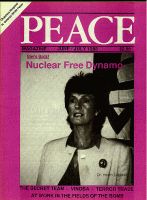
Peace Magazine Jun-Jul 1988, page 7. Some rights reserved.
Search for other articles by Dwight Burkhardt here
On Ash Wednesday, twelve Canadian church leaders issued a strong critique of the federal Defence White Paper, "Challenge and Commitment: A Defence Policy for Canada." Those signing included official heads of the five largest Canadian churches (Anglican, Lutheran, Presbyterian, Roman Catholic, and United) and representatives of Armenian, Ethiopian Orthodox, Mennonite, Polish Catholic, and Quaker groups.
Under the auspices of the Canadian Council of Churches, the churches had asked Project Ploughshares to prepare a document for face-to-face meetings with Prime Minister Brian Mulroney and Minister of External Affairs Joe Clark. When both refused to meet, the church leaders decided to release the Open Letter.
The lengthy Open Letter says that Canada's primary "defence" responsibility is to the development and preservation of a just international order that respects the integrity of Canada and other countries. There is "no place for nuclear weapons in national defence policies" in this "common security'" approach. "A foundational objective of Canadian defence policy must be to reduce the nuclear options of all the nuclear powers." Canada must urgently pursue "mutual and universal nuclear disarmament" and elimination of other weapons of mass destruction. Canada must also respond constructively to military threats to the international order beyond our own borders.
Europe is one such place where international stability is threatened by the concentration of military power. These arsenals must be dismantled. Where the White Paper called the promise of detente "exaggerated," the church leaders say NATO and NORAD are partly responsible for its failure. They challenge the White Paper's claim that adding to NATO's military forces contributes to security or the prevention of war.
Their letter says that Canadian forces play no useful military role and questions their political rationale as a means to gain influence in abroad when Canada has failed to advocate alternatives to such NATO policies as nuclear first-use and conventional rearmament. However, the church leaders' letter stops short of calling for actual Canadian withdrawal from NATO.
The issue was one of the few points of disagreement to emerge during the six-month drafting process of the letter. The church leaders reportedly weakened statements in earlier drafts which seriously questioned NATO's role because their constituencies would not support them. The letter goes only so far as to say "competing military alliances are a threat to peace" and NATO's "military strategy is dangerous and counter-productive." However, the implication of the church leaders' position, even though unstated, would seem to be that if Canada cannot help to change NATO policies, then withdrawal seems a logical option.
The church leaders do suggest a defence policy principle which, if adopted, would radically change Canada's defence roles and forces. Given our strategic place between the two
superpowers, Canadian territory should not be made available to any other country to attack or threaten a third country. For this reason, Canada should refuse to participate in the Air Defence Initiative and related Space Defence Initiative (Star Wars).
Such a posture would help stabilize the international order but would also require Canada to patrol its territory. However, nuclear-powered submarines are not needed; rather, they contribute to U.S. Maritime Strategy, which undermines Canada's commitment to the nonproliferation of nuclear materials for military purposes. Instead, the church leaders support a transnational Arctic nuclear weapon free zone and passive sensors.
The church leaders also advocate that national defence policies be based on "defensive rather than offensive capabilities and should be designed to defend without threatening or provoking neighbors or adversaries." This "non-provocative defence" approach (see p.21, this issue) would still require military capability, as opposed to "civilian-based defence" proposals, but would remove the threats that drive arms races.
According to the Open Letter, "military force has a minimal role to play in the pursuit of our common security." It acknowledges that complete renunciation of military capacity is impractical, but states that "the excessive level of current spending, worldwide, on the maintenance and accumulation of military force (now more than a trillion dollar annually) is not only impractical but immoral and dangerous." Increased military expenditures cannot be justified on economic or industrial policy grounds as promoted in the White Paper.
Despite clear and strong statements on most aspects of Canadian defence policy, the church leaders only offer ambiguity on the one issue about which one would want religious leaders to be clear and unequivocal - the morality of nuclear deterrence. They state that the use of nuclear weapons is neither rational nor moral. On nuclear deterrence itself, they are less clear. At best, they say it is a necessary evil we all live under, due to our collective human failure.
"Nuclear deterrence brutalizes friend and foe alike. None escapes this pervasive threat, and societies associated with perpetuating it cannot escape its moral burden. Nuclear deterrence is a judgment on our collective failure to meet our obligation to build peace and justice."
The church leaders fail to take the moral position that a security system based on nuclear deterrence is itself immoral, which would be consistent with their analysis. They do not even follow the U.S. Catholic bishops in calling deterrence morally acceptable only if it leads to nuclear disarmament. It is hard to understand this failure of nerve, given the rest of their letter.
Dwight Burkhardt works with Canadian Council of Churches.
JUNE/JULY 1988

Peace Magazine Jun-Jul 1988, page 7. Some rights reserved.
Search for other articles by Dwight Burkhardt here